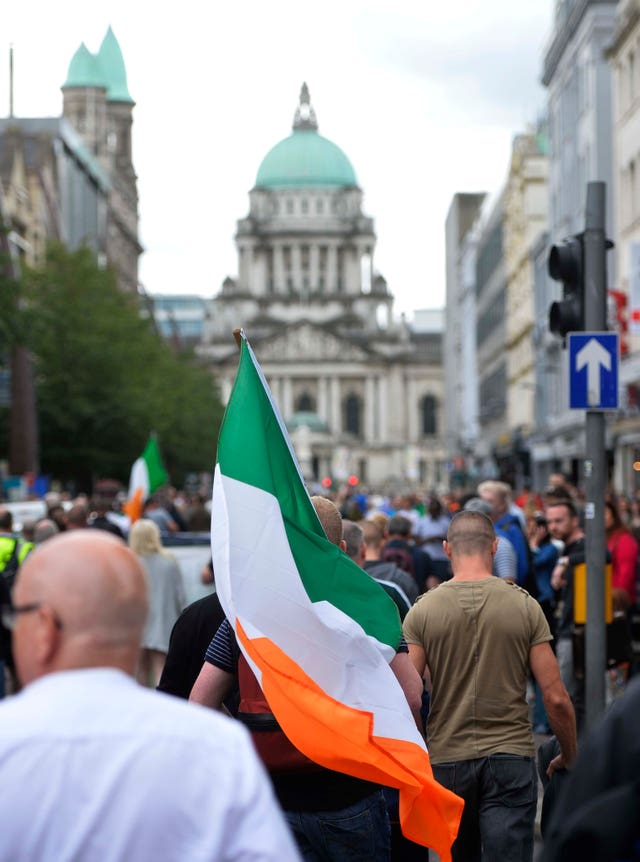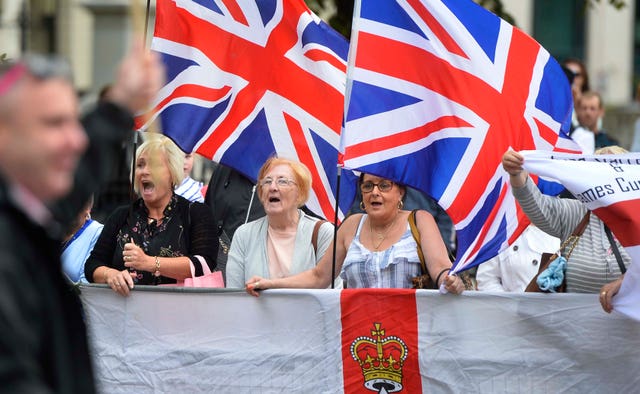
A controversial anti-internment parade passed without incident as hundreds of republicans paraded through Belfast city centre.
It is the first time in four years that the Anti-Internment League (AIL) has protested in the city centre, after they were granted permission by the Parades Commission.
There were heightened concerns that trouble would erupt as two loyalist counter-demonstrations took place along the route of the republican parade.
 The protest passed without any violence (Mark Marlow/PA)
The protest passed without any violence (Mark Marlow/PA)
However, despite a number of verbal exchanges between loyalist protesters from Northern Ireland Against Terrorism group and some republicans, the protest passed without any violence.
There was a heavy police operation along the route which saw hundreds of republicans and a number of flute bands gather in Writers’ Square before making their way along Royal Avenue to the City Hall where a number of speeches took place.
The Parades Commission ruled on Friday that participants in the parade could make a return leg from City Hall to Castle Street.
According to the parade organisers, this was to provide a dispersal point for participants.
The annual parade, which started in 2013, marks the beginning of internment, or detention without trial, which was introduced at the height of the Troubles in Northern Ireland in 1971.
AIL spokesman Dee Fennell said the parade was to highlight the “ongoing use” of internment.
 There were a number of verbal exchanges (Mark Marlow/PA)
There were a number of verbal exchanges (Mark Marlow/PA)
He also defended people associated with dissident republicans parading through Belfast’s main shopping district on a Saturday afternoon.
“I don’t think it’s intimidating. The largest military organisation you are going to see on the streets is the PSNI and they will be heavily armed as they always are,” he said.
“I don’t think people marching through Belfast city centre in a dignified fashion will intimidate anyone.
“It’s hypocritical that the main critics of this parade march through the city centre numerous times through the year, not just for religious reasons but to commemorate British military and also members of British death squads that operated here.”
He denied that any participants in the anti-internment parade have been involved in rioting in the past saying that the onus is on Unionist representatives to appeal to counter-demonstrators to “act in a dignified way”.
He added: “The name of the organised body is Northern Ireland Against Terrorism, which in itself is ironic because we have some members of the Unionist community who have no problem commemorating UVF murderers.”
The main speaker of the event, Mandy Duffy, who is the vice-chairperson of dissident republican party Saoradh and sister-in-law of leading Lurgan republican Colin Duffy, told the crowd that republicans are being held in prisons under “draconian legislation”.
#Saoradh Vice-Chairperson Mandy Duffy, will be the main speaker at today's Anti #Internment Rally in Belfast #IRPWA #PoliticalPrisoners pic.twitter.com/7L57uzKhAV
— Saoradh (@EireSaoradh) August 11, 2018
She said: “Recently we have witnessed the imprisonment of republicans in the 26 counties (Republic of Ireland), including comrades from the North due to the most spurious of charges and a show trial in the anti-republican Special Criminal Court.
“Portlaoise Prison has seen an influx of prisoners held under some of the most draconian legislation ever witnessed in Ireland.
“A conveyor belt of charges and convictions has begun to emerge with arrest, spurious charges and guaranteed convictions seeing republicans being imprisoned at an alarming rate.
“Republicans in the occupied six counties also face extensive draconian policies within the courts in the form of undetermined sentences, and extended sentences.
“Those held on such charges will find themselves in the hell of Magheraberry where isolation, controlled movement and forced strip searches are used to torment political prisoners with various other tactics.
“We must commit ourselves to defend prisoners, the most vulnerable element in the republican community.
“We must make clear to all pro-imperialists that we will not stand by while political captives face oppression.”
There was strong opposition to the parade taking place from Unionist politicians who said that businesses and traders will be negatively impacted by the march.
Ulster Unionist Jim Rodgers said that any scenes of disorder would send out the wrong message to visitors from Northern Ireland, but added that he was satisfied from police that there was to be no disruption to businesses.
A number of tourists visiting Belfast could be seen taking pictures and videos from passing buses.


Why are you making commenting on The Herald only available to subscribers?
It should have been a safe space for informed debate, somewhere for readers to discuss issues around the biggest stories of the day, but all too often the below the line comments on most websites have become bogged down by off-topic discussions and abuse.
heraldscotland.com is tackling this problem by allowing only subscribers to comment.
We are doing this to improve the experience for our loyal readers and we believe it will reduce the ability of trolls and troublemakers, who occasionally find their way onto our site, to abuse our journalists and readers. We also hope it will help the comments section fulfil its promise as a part of Scotland's conversation with itself.
We are lucky at The Herald. We are read by an informed, educated readership who can add their knowledge and insights to our stories.
That is invaluable.
We are making the subscriber-only change to support our valued readers, who tell us they don't want the site cluttered up with irrelevant comments, untruths and abuse.
In the past, the journalist’s job was to collect and distribute information to the audience. Technology means that readers can shape a discussion. We look forward to hearing from you on heraldscotland.com
Comments & Moderation
Readers’ comments: You are personally liable for the content of any comments you upload to this website, so please act responsibly. We do not pre-moderate or monitor readers’ comments appearing on our websites, but we do post-moderate in response to complaints we receive or otherwise when a potential problem comes to our attention. You can make a complaint by using the ‘report this post’ link . We may then apply our discretion under the user terms to amend or delete comments.
Post moderation is undertaken full-time 9am-6pm on weekdays, and on a part-time basis outwith those hours.
Read the rules hereLast Updated:
Report this comment Cancel